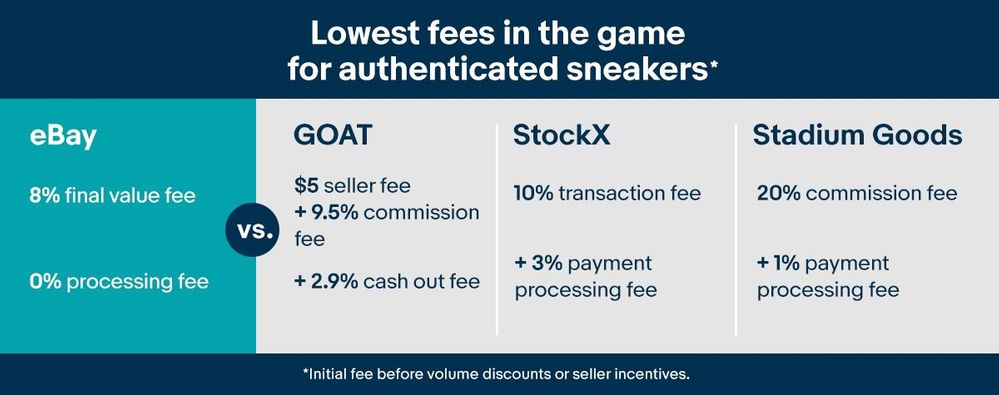eBay Brings Back Fees on Sneaker Sales – Will This Impact Its ‘High-Value’ Buyer Strategy?
The free ride for many eBay athletic sneaker sellers is coming to an end in January as the company will reintroduce final value fees on January 19, 2022.
Two years ago, the company launched a promotion eliminating final value fees on sneakers that sold for $100 or more to catch up lost ground to new marketplace competitors like GOAT and StockX that focused on the fast-growing sneaker business.
While GOAT and StockX also entered other categories that compete with eBay, the sneaker business seemed to be a “crown jewel” and one that appeared to bother eBay the most as it was the only category in which it offered this promotion.
When eBay launched the no selling fees promotion for eligible sneaker sales, it didn’t specify an end date, but now after two years, the free ride is over for sellers.
Starting on January 19, 2022, the final value fee for sneakers over $100 will be 8% or 7% if the seller has an eBay Store subscription (Basic or above).
The marketplace will continue to waive insertion fees for sneakers and emphasized in its announcement that its pricing is still more competitive than its strongest competitors in the category.
“eBay is and will remain the most competitive destination for sneaker resale. We have the lowest fees among competing marketplaces and offer the latest resources to help accelerate, grow and scale your business: no-fee verified returns, seller protections and Authenticity Guarantee. To date, eBay has authenticated about 2 million sneakers globally, with a pair of sneakers purchased every four seconds.”
eBay Statement

Will New eBay Sneaker Fees Impact Sales?
That is truly the million-dollar question. Over the last year, the company hailed in its quarterly earnings calls the growth of its sneaker business a huge success. Yet, it didn’t make any direct money from those sales.
Coincidentally, in the last two-quarter earnings calls, eBay claimed that many new sneaker buyers (and buyers from its other eBay Authenticity Guarantee programs) represented a higher value buyer as they often purchased products on the marketplace in other categories.
eBay claimed these buyers are now a focus for growth as it tries to somewhat explain away significant “regular” active buyer losses for the last two consecutive quarters.
This problem of active buyer losses may actually be worse when including the first months of the pandemic during which eBay gained millions of buyers which apparently did not stick around a year later.
In its last earnings call, both eBay CEO Jamie Iannone and CFO Steve Priest emphasized the importance of high-value buyers so frequently, prompting one Wall Street analyst to call out the pair by asking, “will you exit low-value buyers?”
With eBay introducing final value fees again in the sneakers category, apparently, eBay must believe that it has attracted enough of an audience (buyers and sellers) to actually make money in this category.
Furthermore, the company agreed to purchase its third-party authenticator service Sneaker Con Digital in November, signaling the first hint that unit volume had matured enough for eBay that it needed to solidify this business strategy by owning the authentication side of the transaction.
While the zero final value fee promotion was a great incentive for sellers, the new final value fees do seem to be below other competitors, which should avoid mass defections to competing platforms.
Ultimately, the key will be that enough sellers offer products buyers want. But with eBay now re-introducing final value fees to sneakers over $100, competitors may target sellers by offering promotions to at least temporarily reduce the final cost to sellers.
This will be a tricky time for eBay as it will need to justify its investment by offering free final value fees for two years and acquiring Sneaker Con Digital. If new buyers defect (or return) to other marketplaces because sellers are being lured over with promotions, then the company’s strategy of focusing on these new “high-value” buyers could become a problem.
If you liked this article and would like to engage with other small business entrepreneurs selling on marketplaces, join our [the_ad id=”41560″ inline =”1″]. You can also find us on [the_ad id=”41579″ inline =”1″], [the_ad id=”41573″ inline =”1″], [the_ad id=”41575″ inline =”1″], and [the_ad id=”41577″ inline =”1″] or sign up for our newsletter below.
SIGN UP. BE INSPIRED. GROW YOUR BUSINESS.
We do not sell your information. You can unsubscribe at any time.
Richard Meldner
Richard is co-founder of eSeller365. He has over 17 years of experience on eBay which includes tens of thousands of sales to buyers in over 100 countries and even has experience with eBay’s VeRO program enforcing intellectual property rights for a former employer. And for about two years Richard sold products on Amazon using Amazon FBA in the US.
To “relax” from the daily business grind, for a few weekends a year, he also works for IMSA as a professional race official.

